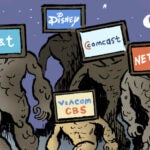Here’s today’s AdExchanger.com news round-up… Want it by email? Sign up here.
The All-In Risk
The natural state for digital media monetization isn’t 100% advertising or all subscriptions, but some balance of both.
The Athletic couldn’t get by on subscriptions alone, and BuzzFeed News died on the ad-only vine. But media companies are now creating sturdier online revenue streams, writes Ben Thompson of Stratechery.
Although The New York Times focuses on subscriptions, that data powers the ads business.
Another example is YouTube, which is an advertising behemoth, of course. But since the 2015 launch of YouTube Red (now YouTube Premium), it’s offered ad-free subscriptions.
Not to mention the elephant in the room – Netflix – which has already flipped the average revenue per user in favor of its cheaper, ad-supported plan.
This trend is a warning sign and an opportunity for media companies that are fully invested in either subscriptions or ads.
Substack, for instance, is laser-focused on subscriptions to the degree that it’s missing the opportunity to sell ads based on its aggregated subscriber data and readership habits. Substack writers would earn more – and be able to add new subscribers – by cultivating readers with ad-supported access that bridges to an eventual subscription.
On This Farm He Had A Bot
The AI chatbots are here to save small farmers. No, not the people who grow food – rather, content farmers.
Bloomberg and media watchdog NewsGuard have identified 49 websites with fully AI-generated content that began publishing this year (duh). Most serve programmatic ads and some publish sponsored content.
These sites run the gamut from “breaking news” (any “Daily Business Post” readers? No?) to lifestyle and celebrity updates. NewsGuard found them by searching for phrases commonly used by AI chatbots.
Naturally, the bots churn out content riddled with inaccuracies.
For example, “CelebritiesDeaths.com” falsely reported President Biden’s demise. Fortunately, nobody trusts these sites. CelebritiesDeaths.com’s report didn’t cause a run on the stock exchange. But the content is still nefarious.
OpenAI’s ChatGPT seems to be the tool of choice, although some sites may use Google Bard. And around half monetized with Google’s ad platform, although Google turned off ads on these sites after being contacted by Bloomberg.
But how findable is this content?
Although Google Search does typically down-rank AI-generated content, life, uhh, finds a way – and so does AI.
Eyes On AIs
Sticking with the AI theme, FTC attorney Michael Atleson of the Division of Advertising Practices issued a general warning to help companies understand how the agency thinks about potential AI-related suits.
If, for example, a generative AI product, like an AI search engine, produces sponsored text and/or images, the results must be clearly labeled and distinguishable from organic responses (like in a normal search feed).
People often trust seemingly impartial machines that confidently give advice. But generative AI tech can be outright wrong or adept at channeling users to certain outcomes. “Many commercial actors are interested in these generative AI tools and their built-in advantage of tapping into unearned human trust,” Atleson writes.
The FTC also says people should know if they’re communicating with a person or a chatbot – which means companies must clearly disclose that fact.
And Atleson warns that despite the need for belt-tightening, businesses should think twice about letting go of personnel devoted to ethics and responsibility for AI and engineering.
“If the FTC comes calling and you want to convince us that you adequately assessed risks and mitigated harms,” he writes, “these reductions might not be a good look.”
But Wait, There’s More!
The Trade Desk strikes a partnership with Attain, parent company of cash-advance app Klover, for purchase data. [Insider]
The Amazon Publisher Services pricing saga continues, but Amazon grants its ad tech partners a reprieve. [Digiday]
The writer’s strike, DVDs and the death of free money. [The Information]
WPP and IPG both felt the impact of the tech sector’s slimmed wallets in Q1. [Marketing Brew]
Time, the once-proud magazine, launches an ecommerce and product review site in partnership with Taboola. [MediaPost]
Snap’s My AI opens to advertisers with a search ad format. [Ad Age]
You’re Hired!
In-game ad tech startup Anzu hires Meta vet Nerissa MacDonald as EVP of global sales. [release]
Adludio appoints former We Are Social CEO Benjamin Arnold as president for North America. [release]













